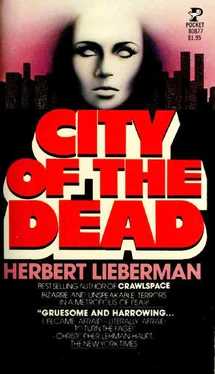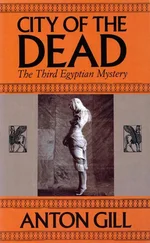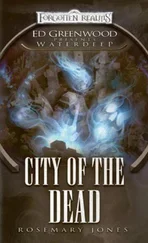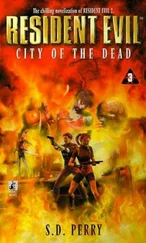“Get ’em all out?”
Up ahead a patrolman swings a pair of heavy glass doors open before them.
“That was easy.” says Fox. “Manager wasn’t all that happy about it. Wanted us to wait and let ’em have their dessert so he could charge ’em full price.”
They swing on through the glass doers of the First National City Bank, located just below the mezzanine. Inside the bank the hum and buzz of disrupted enterprise going on amidst a semblance of order. Bombs or no bombs, it is business as usual at the bank. Unsuspecting clients bustle in, wanting to cash checks, make deposits, negotiate loans. They’re suddenly caught up in the subdued chaos of the place. Hordes of police, frightened sellers, harried bank officials scurrying about, red in the face, talking in whispers, calming, soothing, reassuring both clients and personnel.
“Right up this way, Sarge.” A patrolman waves them on through a small corridor leading to the back.
“Get anything out of them yet?” Haggard asks.
“Nope. Shut tight as clams.”
Haggard sighs, pushes on through a heavy walnut door and then another door with a pane of frosted glass, the words MAIL ROOM stenciled in gold letters upon it. “All right—let’s take ’em one at a time.”
Beyond the glass door a large mail room. Boxes, cartons, U.S. Post Office canvas wagons, Pitney-Bowes franking machines, an immense wall of pigeonholes, each crammed with envelopes, more bundles of letters waiting to be sorted. And the place crawling with patrolmen and detectives.
Off to one corner, three white youths sit. Somewhere between the ages of eighteen and twenty. They wear identical outfits consisting of fatigue jackets, combat boots, berets. They sit dazed and sullen, slumped in chairs against the wall, while a beefy Irish patrolman named O’Doyle hovers above them, pad and pencil in hand, apparently questioning each.
“Okay, O’Doyle,” says Fox, marching up, “I’ll take it from here.”
“Right, Sarge.” The cop shoots a disapproving scowl at his charges.
“Get anything out of ’em?” Haggard asks.
“Not a thing, Lieutenant. They’re nasty little beggars.” O’Doyle shoots another scowl toward the three youths, speaking suddenly quite loud. “If they give you any smart-ass, Lieutenant, just let me know. Particularly that little mouse-eared bastard over there. Thinks he’s a tough one.”
O’Doyle juts a stubby finger in the direction of a small, pallid, intense youth, more sullen, obviously more defiant, than the other two. “Just lemme know if he gets funny with you, Lieutenant.”
“Righto,” Haggard murmurs softly, his restless, searching blue eyes already recording, assessing, evaluating. “Leave that one here for me. You can take the other two out with you.”
The big patrolman lumbers swiftly toward the youths. “On your feet, you two.” He turns then to the small, sullen youth left behind. “Hear that, sonny?” O’Doyle snaps. “You smart-ass the lieutenant here, I’ll tear your nose off.”
A few of the other patrolmen chuckle, then move out behind O’Doyle and the two boys.
For a long while after they’ve gone Haggard ignores the boy. He studies some notes, gazes thoughtfully around the room, chats quietly off to one side with Fox, letting the youth stew a bit.
Then suddenly he turns, marches back, coming abruptly at the boy, taking him by surprise. “Stand up.”
“What?” Startled, the boy gazes up only to see those two small pebbly blue eyes boring down upon him.
“Stand up, I said.”
The boy continues to sit, an impudent little smirk creeping slowly across his face. In the next moment he is jacked straight to his feet, hauled up unceremoniously by the collar, and rammed up hard against the wall.
“When I say stand,” Haggard snarls between gritted teeth, “I mean stand.”
“Hey, now look, man—”
“Man?” Haggard’s eyes bulge from his head. His voice booms like a clap of thunder. “Man? Who the hell are you calling man? My name isn’t man. When you address me, it’s Lieutenant, or sir, or your Lordship. None of this man crap. Get it?” He crowds the boy up harder against the wall, twisting the collar tighter around his throat, so that he makes a gagging sound. “Get it, sonny?”
Red-faced and gasping, the boy nods with some difficulty, while Haggard’s huge paw tightens its grip on his collar.
“Now, what’s your name?”
This time the youth, cheeks flared red, eyes tearing not from hurt but inner rage, swallows hard.
“Name?” Haggard says once more.
“I refuse to answer any questions until I’ve had benefit of counsel,” the boy says, bristling with defiance. He’s obviously educated. Middle class. And with that snotty, well-fed, never-deprived manner, that you-can’t-do-anything-to-me attitude of a youth brought up in a comfortable suburb who’s never had to contend with anything more than his own boredom.
“Benefit of counsel.” Haggard whistles, and calls over his shoulder at Fox. “I take it he’s been apprised of his rights.”
“He has, Lieutenant. Name is Douglas Mears. Seventeen years old. Comes from Greenwich, Connecticut, according to identification in his wallet.”
Haggard’s beady eyes pin the youth back hard against the wall. “Don’t you have anything better to do with your time, Douglas, than making a goddamn pain in the ass of yourself?”
“I refuse to say another word until I’ve had the benefit of legal counsel.”
“Endangering the lives of a lot of innocent people? Dressed up in that silly costume—a beret and a fatigue jacket? Like a road-company Fidel Castro.”
“I refuse to—”
A sharp crack across the jaw from Haggard’s open palm stifles the rest of the reply.
“He call his lawyer?” the detective asks.
“His father’s his lawyer.”
A slow, mean grin widens Haggard’s features. “That so, Douglas?”
“It damned well is,” the boy hisses. “And you’re gonna be sorry you used your hands on me.”
“Me? Sorry?” Haggard laughs out loud. “That little shot’s given me more pleasure than I’ve had all week.”
Fox lifts a heavy section of lead pipe and walks it slowly across the room to Haggard. “Caught him with this little beauty in a stairwell on the thirty-second floor.” Haggard takes the device, now safely deactivated, and studies it. It’s a pipe bomb of a fairly typical sort—center filled with about a pound of gelignite, simple wire fuse. A fairly crude thing. A child might have easily assembled it.
“Pretty stupid for a smart boy like you, Douglas.” Haggard slowly shakes his head from side to side. “Getting caught like that, holding all the goods. Hope Papa’s a good lawyer.”
Haggard and Fox both laugh spitefully. In the next moment, the boy’s cockiness appears to melt a bit. Suddenly his eyes seem puzzled and not a little frightened. “Like I told the other pig—”
“Pig?” Haggard wheels and peers hard at him.
“That’s right.” The boy sneers. “That pig cop.” He thrusts a finger at Sergeant Fox.
“Hear that, Fox,” Haggard calls over his shoulder. “Douglas here calls you a pig.”
“That’s a lie,” Fox says, deeply aggrieved. “I’m a Democrat.”
“That was very unkind of you, Douglas,” says Haggard sorrowfully. “The sergeant here is a very fair man. A Democrat. A husband. A father. Would you call his children sucklings?”
“I’m sorry,” young Mears stammers, obviously baffled. “I didn’t mean—I meant only him. That guy.”
“What guy?” says Haggard, staring around as if he saw no one.
“That guy.” Once again the boy thrusts his finger at Fox.
“Oh, you mean the sergeant?”
“That’s right.”
Читать дальше












